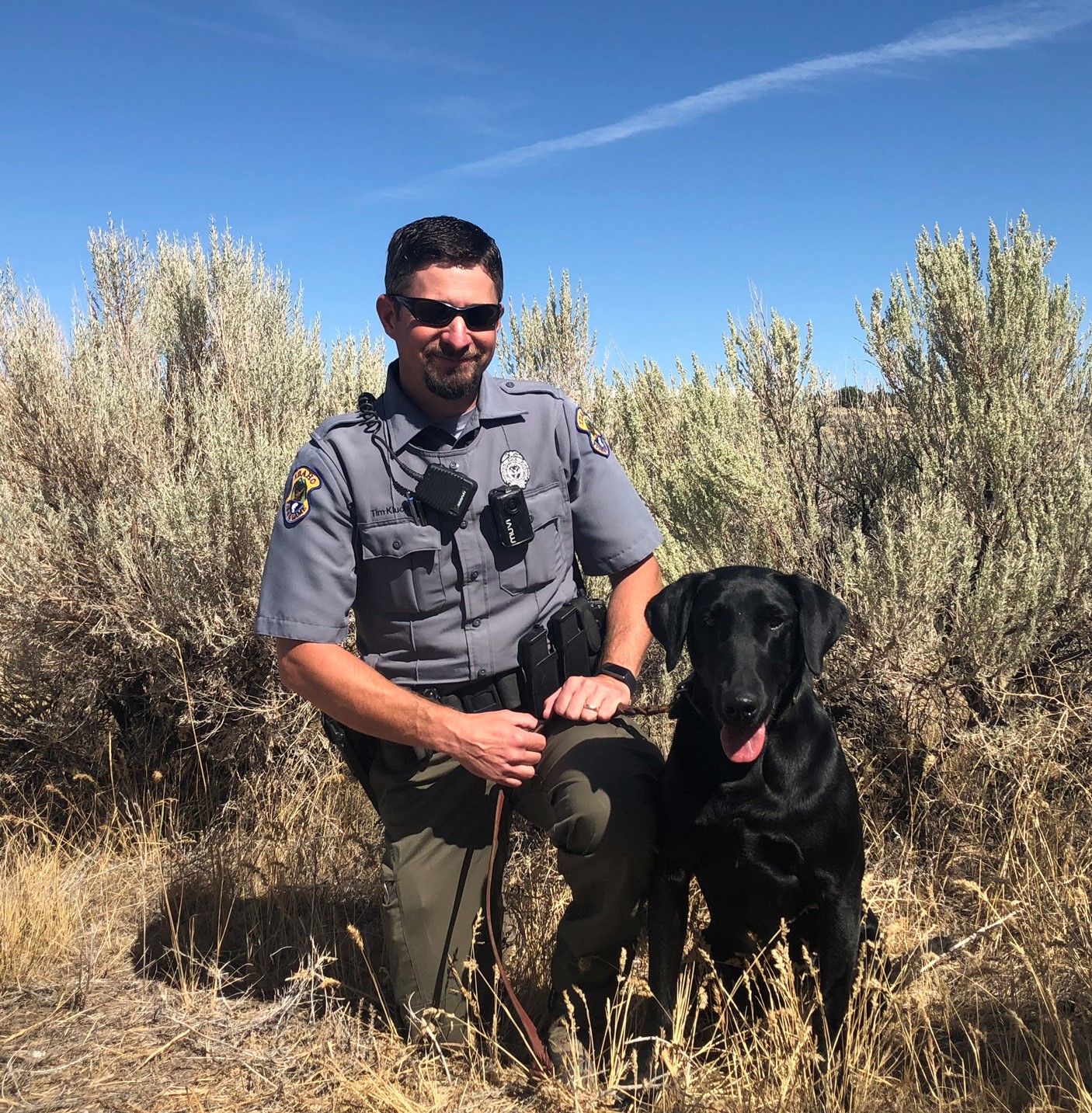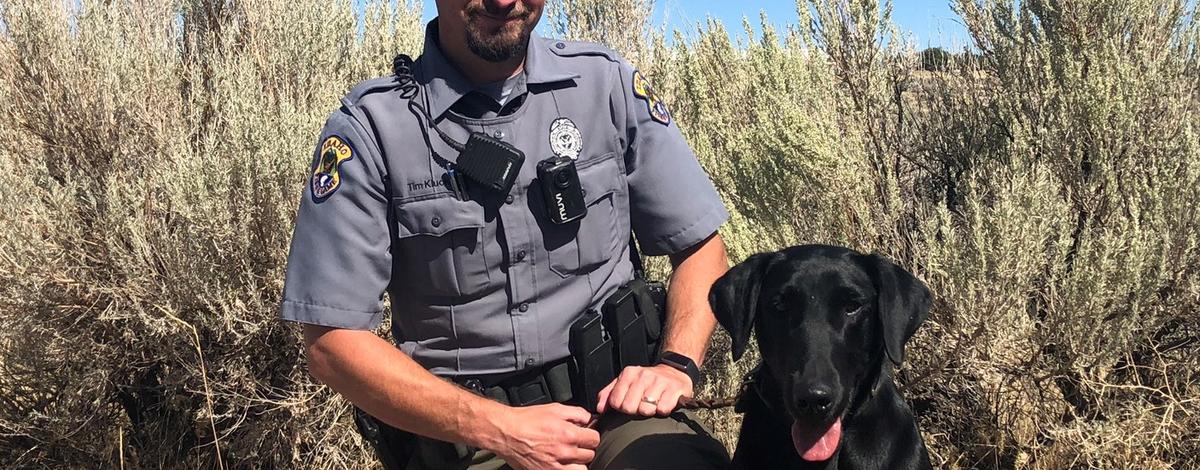The dog days of summer may be over, but for six-year-old black lab Dexter--- one of Idaho Fish and Game’s K-9s -- that suits him just fine. Fall brings on one of the busiest and most exciting times of year for this eager sleuth and his partner, District Conservation Officer Tim Klucken of Pocatello, as they hit the hills, seeking evidence to solve wildlife crimes or possibly searching for a lost hunter.
One particular morning, Dexter hops out of the back of the air-conditioned cab in Klucken’s enforcement truck, and with the click of his orange nylon collar, knows it’s time to get to work. The scenario? A witness reported seeing someone take a shot at a deer with a rifle during the archery-only season in southeast Idaho. Tail wagging and nose to the ground, Dexter responds to the command to search the area for clues. With “dogged” determination he methodically works the sagebrush and eventually signals he has found something Klucken will want to see—a brass casing from a rifle bullet. Perfect. This piece of evidence can be potentially traced back to the gun that fired it.
This was just a training exercise, but scenarios like it have played out before in real cases for Klucken.
“There have been cases that we couldn’t have made had it not been for our K-9s like Dexter,” Klucken proudly says about his partner. “One time he found a single drop of blood at a scene, and it was genetically matched to a deer illegally taken by a poacher.”
With all the training and tools at the disposal of Fish and Game’s conservation officers, there is one exceptional skill Dexter has that they don’t: the ability to sniff out seemingly imperceptible clues such as gun powder, gun oil, blood trails, and even human scent.
“Dexter has an amazing nose,” remarks Klucken. To emphasize this point, Klucken adds, “Imagine a pizza cooking in an oven. People can definitely smell the pizza, but Dexter can actually smell every ingredient that went into making that pizza.”
Having a great sense of smell isn’t the only desirable trait of a Fish and Game K-9. These dogs must be a sporting breed rather than a German Shepherd or Malinois which are typically used for other law enforcement agencies or the military. They must exhibit a high prey drive as well as a high play drive which makes these dogs teachable. And, they must be specifically trained to do the work they do.
When Dexter and Klucken were paired together in 2015, the two headed to Indiana where they underwent 400 hours of training offered by the state’s Department of Natural Resources over a 9-week period. During that time, Dexter was trained on waterfowl, turkeys, and white-tailed deer. When they returned to Idaho, the training continued with a focus on fish, mule deer, elk, sage grouse, and other Idaho species.
The two joined Fish and Game’s Southeast Region enforcement team in January 2020 when Klucken promoted to District Conservation Officer, but this wasn’t Klucken’s first stint in southeast Idaho… and how he got his start in this region is quite the fish story.
Klucken, a 2000 graduate of Idaho State University with a Bachelor’s of Science degree in Biology, started as a summer bio-aide in the Southeast Region, working on a fisheries study on St. Charles Creek in Bear Lake County. Over the next decade, he worked as a fish technician and fish culturist throughout the state including Stanley, Nampa, the Hagerman and Clearwater Hatcheries, eventually returning to the Southeast Region where he worked as both the Assistant Hatchery Manager and later the Hatchery Manager in American Falls.
But, in 2011, Klucken was ready for a change of pace with new challenges and new excitement. Already certified as a Level 1 Enforcement Officer for Fish and Game, he was ready to take the next step and became a Senior Conservation Officer. This new and very different career path took him first to Arco and then to Dubois.
During this time, a black lab puppy named Dexter was born at the Mill Iron Retrievers Kennel in Hagerman. Most would have thought he was destined to become a superb retriever for some lucky waterfowl hunter, but the kennel donated him to Idaho Fish and Game for use in their K-9 program. Dexter is now one of 4 dogs working with conservation officers in Idaho—a program that is funded in part by the Idaho Fish and Wildlife Foundation, Idaho Fish and Game, and donations from local companies and organizations like Safari International. Donations also come in from private citizens like Dee Pogue, the widow of the late Fish and Game Conservation Officer Bill Pogue who was killed in the line of duty nearly 40 years ago.
Though enforcement was not the original career path for either Klucken or Dexter, their paths crossed 5 years ago, and the two have been working alongside each other since. Klucken will tell you that not only is Dexter an indispensable tool for the kind of work conservation officers do, he is a great ambassador for the agency.
“Dexter loves people and they love him. Sometimes he is able to open doors with members of the public that might not otherwise talk to officers,” says Klucken.
So what does Dexter get out of this arrangement, besides going to work every day at a job he loves? Simple. For each task well done, he’s rewarded with a Kong toy stuffed with treats, lots of pats on the head, and an enthusiastic “good boy”. At the end of the day, he enjoys plenty of downtime and a chance to hang out with Klucken’s Labrador retriever, Finley. There will come the day that Dexter will look forward to retirement like a lot of humans do, but for now, he’s happiest when “working like a dog”.


